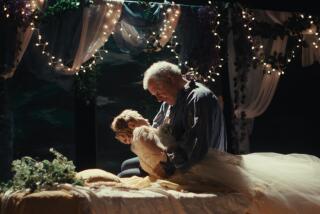Documentary tells full story of Hunter S. Thompson
OF COURSE, there were the drugs. And the drinking. And guns. And more drugs. Given his notorious lifestyle, it can be hard to keep in mind that Hunter S. Thompson was first and foremost a writer, a frontline chronicler of the promise and adventure of the 1960s and the burnout and aftermath of the 1970s.
The revitalization of Thompson’s literary and cultural legacy is at the center of “Gonzo: The Life and Work of Dr. Hunter S. Thompson,” the new documentary by Oscar-winning filmmaker Alex Gibney. When he was drafted onto the project by producer Graydon Carter, Gibney says he was passingly familiar with Thompson’s work but had never actually met the man himself, who took his own life in 2005.
“I wasn’t going to be able to be the insider,” Gibney recalls. “I was the outsider. But one of the things I could do that was valuable was to remind people how good the writing was. I think Hunter the character had overwhelmed Hunter the writer. Everybody knew him as this wild and crazy guy who just did lots of drugs, and had forgotten why they paid attention to him in the first place.”
To create his portrait of the writer, Gibney drew from a wealth of sources, including Thompson’s unpublished manuscripts, personal letters and photographs; interviews with his contemporaries and family members; and chunks of a 1978 BBC documentary -- which some might recognize as an extra on the DVD for the film adaptation of “Fear and Loathing in Las Vegas.”
But to those steeped in Thompsonalia, the film’s biggest get may be the audiotapes that came from Thompson’s ever-present recorder. They include an excerpt from the recording of an out-of-control mid-’60s party at the Northern California ranch of writer Ken Kesey that was chronicled in Thompson’s book “Hell’s Angels” and Tom Wolfe’s “The Electric Kool-Aid Acid Test.”
The stash of Thompson’s vintage audio recordings was excavated by archivist Don Fleming, hired by Gibney to comb through the boxes and boxes of material Thompson had carefully organized before his death. (And yes, for those of a certain age, Don Fleming is the one and same who has been a member of such stalwart indie-rock outfits as the Velvet Monkeys.)
Thompson’s archive “just totally blew our minds,” Fleming says. “We were hoping to get a few tapes with him on it, but this was a whole different level than what we expected.
“Basically he recorded everything from ’64 until he died. He never stopped. And they were all dated, they all had titles. It’s not just random tapes, it’s very deliberate. He certainly made a lot of written notes as well, there’s a bunch of journals, but he really did use the cassette deck as a tool for the way he created his work. A lot of it shows up verbatim in the text of his books.”
For Gibney, the challenge in focusing on Thompson, who is somehow both overexposed and underappreciated, was to create a film both for fans and neophytes, as well as a cleareyed tribute to that which will last. The words come before the myth.
“It’s a story about an artist, a writer,” Gibney says. “The lesson is there’s a benefit to following your path and finding your own voice and being fearless. The other lesson is it gets very hard, when you have some success, to have any perspective on yourself. That’s more a life lesson, but the artist lessons are don’t be precious, think about the way the world works and find your own way through it.”
‘GONZO: THE LIFE AND WORK OF DR. HUNTER S. THOMPSON’ WHERE: Landmark, West L.A.; Playhouse 7, Pasadena; Sunset 5, West Hollywood; University Town Center 6, Irvine.WHEN: Opens FridayINFO:huntersthompsonmovie.com









